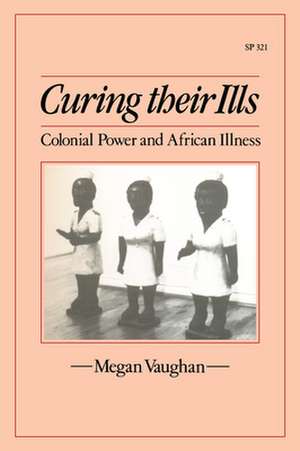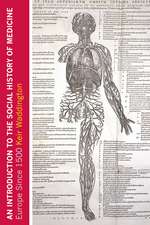Curing Their Ills: Colonial Power and African Illness
Autor Megan Vaughanen Limba Engleză Paperback – 30 sep 1991
This is a lively and original book, which treats Western biomedical discourse about illness in Africa as a cultural system that constructed "the African" out of widely varying, and sometimes improbable, materials. Referring mainly to British dependencies in East and Central Africa in the late nineteenth to the mid-twentieth century, it draws on diverse sources ranging from court records and medical journals to fund-raising posters and "jungle doctor" cartoons. Curing Their Ills brings refreshing concreteness and dynamism to the discussion of European attitudes toward their others, as it traces the shifts and variations in medical discourse on African illness.
Among the topics the book covers are the differences between missionary medicine, which emphasized individual responsibility for sin and disease, and secular medicine, which tended toward an ethnic model of collective pathology; leprosy and the construction of the social role of "the leper"; and the struggle to define insanity in a context of great ignorance about what the "normal African" was like and a determination to crush indigenous beliefs about bewitchment.
The underlying assumption of this discourse was that disease was produced by the disintegration and degeneration of "tribal" cultures, which was seen to be occurring in the process of individualization and modernization. This was a cultural rather than a materialist model, the argument being that Africans were made sick not by the material changes to their lives and environment, but by their cultural "maladaptation" to modern life. The "scientific" discourse about the biological inferiority of "the African," traced by one school of scientists to defects in the frontal lobe, makes painful reading today; it persisted into the 1950s.
Among the topics the book covers are the differences between missionary medicine, which emphasized individual responsibility for sin and disease, and secular medicine, which tended toward an ethnic model of collective pathology; leprosy and the construction of the social role of "the leper"; and the struggle to define insanity in a context of great ignorance about what the "normal African" was like and a determination to crush indigenous beliefs about bewitchment.
The underlying assumption of this discourse was that disease was produced by the disintegration and degeneration of "tribal" cultures, which was seen to be occurring in the process of individualization and modernization. This was a cultural rather than a materialist model, the argument being that Africans were made sick not by the material changes to their lives and environment, but by their cultural "maladaptation" to modern life. The "scientific" discourse about the biological inferiority of "the African," traced by one school of scientists to defects in the frontal lobe, makes painful reading today; it persisted into the 1950s.
Preț: 214.42 lei
Preț vechi: 225.71 lei
-5% Nou
Puncte Express: 322
Preț estimativ în valută:
41.03€ • 42.39$ • 34.13£
41.03€ • 42.39$ • 34.13£
Carte tipărită la comandă
Livrare economică 19 martie-02 aprilie
Preluare comenzi: 021 569.72.76
Specificații
ISBN-13: 9780804719711
ISBN-10: 0804719713
Pagini: 224
Dimensiuni: 152 x 229 x 23 mm
Greutate: 0.36 kg
Ediția:1
Editura: Stanford University Press
Colecția Stanford University Press
ISBN-10: 0804719713
Pagini: 224
Dimensiuni: 152 x 229 x 23 mm
Greutate: 0.36 kg
Ediția:1
Editura: Stanford University Press
Colecția Stanford University Press















